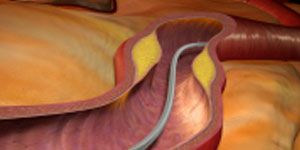Delayed Stenting Improves Outcomes in Patients with Patients with ST-segment Elevation Myocardial Infarction
Study results presented at ACC.13, the 62nd Annual Scientific Session & Expo of the American College of Cardiology, reveal that in selected STEMI patients, deferred stenting may reduce no-reflow and thrombotic events compared with immediate stenting.

Yesterday at ACC.13, Professor Colin Berry, MD, PhD, Chair of Cardiology, University of Glasgow, Scotland, UK presented results from the DEFER-STEMI (Randomized Controlled Study to Assess Whether Deferred Stenting in Acute STEMI Patients Might Reduce the Incidence of No-reflow Versus Conventional Treatment with Immediate Stenting) trial.
No-reflow is a cause of acute, chronic heart failure after primary PCI. It is predictable with clinical risk factors such as duration of ischemia and thrombus burden. No evidence-based preventative treatments exist for it, however.
In selected patients with ST-segment elevation myocardial infarction (STEMI) with risk factors for no-reflow, restoration of flow and anti-thrombotic therapies reduce thrombus burden, indicating that deferred stenting 4—16 hours later is safe and effective. In primary PCI, after initial coronary reperfusion, brief deferral of stenting might reduce no-reflow and its sequelae versus the usual care, with immediate stenting.
Inclusion criteria were one or more of the following: previous MI, 65 years of age or older, initial TIMI flow 0/1, small vessel diameter of less than 2.5 mm, persistent ST elevation, ischemic time of more than 6 hours, occluded artery, thrombus burden, and/or long plaque lesion over 24 mm.
Exclusion criteria were absence of normal flow in the culprit artery, and cardiogenic shock.
All-comers were assessed from March-November 2012. Out of the original 411 candidates, 310 were not randomized, either for lacking inclusion criteria, being unfit for research, having hemodynamic instability, or being eligible but not randomized; leaving 101 that were randomized. Of those, 52 got deferred stenting and 49 received the usual care (immediate stenting).
Independent core lab analyses were blind to the treatment group. Primary endpoint was incidence of no-reflow/slow-reflow (TIMI less than 2). Main secondary endpoints included no-reflow (TIMI 0/1); intraprocedural thrombotic events (IPTEs); main vessel or side branch new or worsened thrombus, abrupt closure, distal embolization, no-reflow (TIMI 0/1), slow-reflow (TIMI 2), or stent thrombosis.
MRI results two days post-MI showed that immediate stenting resulted in TIMI 1 flow post-PCI, and microvascular obstruction. Deferred stenting resulted in TIMI 3 flow post-PCI, and negligible scarring.
In patients who achieved the primary endpoint, immediate stenting resulted in no-reflow (TIMI 0/1) of 14% versus 2% with deferred stenting (P=0.03); no- or slow-reflow (TIMI<3) of 29% versus 6% with deferred stenting (P=0.003); and complications such as IPTEs of 33% versus 10% with deferred stenting (P<0.0001).
At secondary endpoint (median time to deferred stenting = 9 hours), microvascular obstruction (MVO) incidence was 62% in immediate versus 48% with deferred stenting (P=0.22). Median infarct size was 19% for immediate versus 12% for deferred stenting (P=0.32). Investigators reported two cases of recurrent STEMI of less than six hours.
To conclude, in selected STEMI patients, no-reflow and thrombotic events were reduced with deferred stenting compared with immediate stenting. This intervention is potentially a novel, pragmatic, and widely applicable preventative therapy for no-reflow. The safety and cost-effectiveness of deferred stenting in selected patients merits further prospective assessment in a multicenter trial, according to Berry, who said he was “excited about the results; the data consistently favored deferred stenting.”